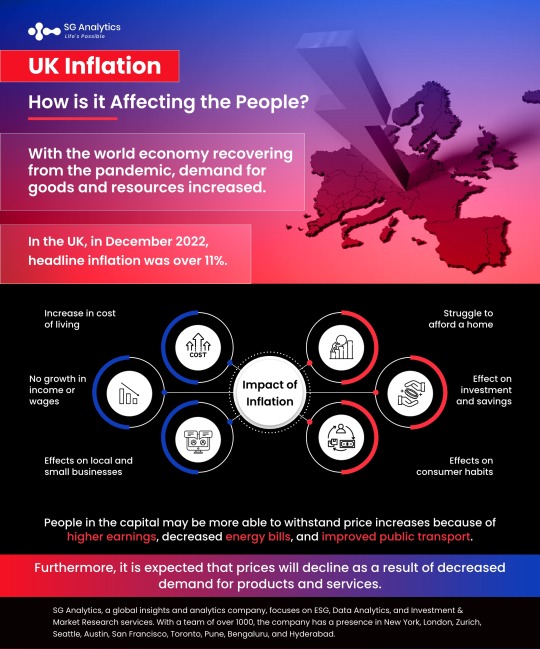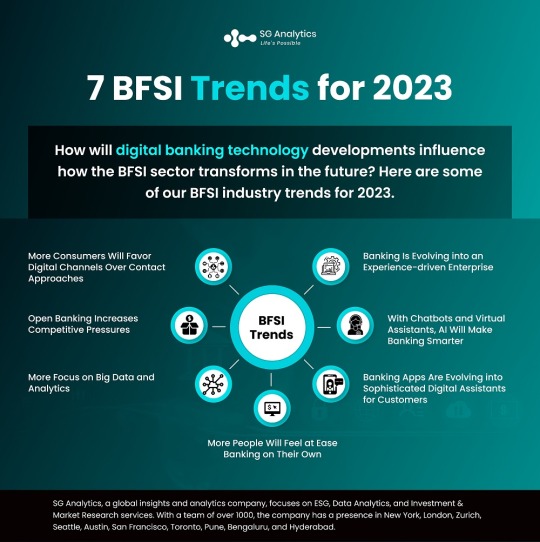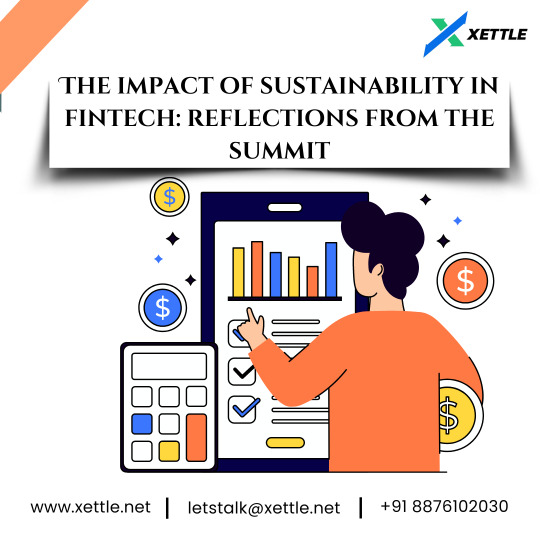#ESG Analytics Company
Text
Learn how ESG Analytics transforms sustainable investment and enables investors to make wise choices. Learn how to evaluate a company's impact using environmental, social, and governance (ESG) aspects, and gain practical knowledge on gathering, combining, and analyzing data. Read this insightful article to learn more about ESG analytics and its function in promoting change.
#ESG Analytics#ESG Data Analytics#ESG Data Analysis#ESG Data and Analytics#ESG Analytics Company#ESG Analytics Services#ESG Analytics Solutions
1 note
·
View note
Text
UK Inflation - How is it Affecting the People?
Inflation amongst consumers increased in numerous nations throughout 2021 and '22. Shortages of essentials caused by the pandemic were a key contributor. With the world economy recovering from the pandemic, demand for goods and resources increased. Inflation worldwide was pushed higher by the conflict in Ukraine because of the rise in commodity prices, which occurred primarily in the first half of 2022.
Many economies' inflation rates appear to have peaked by late 2022, with annual inflation rates beginning to fall by early 2023. The UK's annual inflation rate of 10.1% in March 2023 was higher than that of some other economies.
In the UK, the year ending in October 2022 saw consumer price inflation at its highest pace in four decades. Many necessities, such as rental accommodation, food, and home energy, are increasing in price at a quicker rate than more luxury items, and this trend is mirrored in some regions of the UK.
In December 2022, headline inflation was over 11%. For many Londoners, this was the first time they could remember their real wages falling so quickly.

The rising cost of living is likely to lower standards of living, raise poverty levels, and exacerbate health disparities. Prices for necessities like food and home energy are growing at a far faster rate than general inflation, which is affecting people of all income levels.
Those with more disposable income will be able to weather the rising cost of living better than those with less, but many who were previously financially secure will be pushed into poverty.
Between February and March 2023, annual inflation dipped from 9.2 percent to 8.9 percent, which is still quite high in comparison to the average over the past few years.
Impact of Inflation
Increase in Cost of Living
London's cost of living has been on the rise along with inflation. Housing costs, such as rent and mortgage payments, have risen dramatically, making it harder for individuals and families to locate suitable lodgings at reasonable prices. In addition, people have seen significant price increases in their electricity bills, transportation expenditures, and basic essentials like groceries and healthcare.
No Growth in Income or Wages
Wages have not kept pace with rising living expenses for many London residents. Wages are less valuable due to inflation since the purchasing power of money decreases over time. Because of the increasing cost of living and the generally stable level of personal income, many people are finding themselves in difficult financial situations.

Effects on Local and Small Businesses
London's small businesses may feel the pinch of inflation. Their profit margins are being squeezed by rising rent, utility, and raw material expenses. Some small firms may not be able to afford the cost increases and may have to pass the cost on to customers by raising prices. This may lead to lower levels of consumer demand, which in turn threatens the long-term success of these businesses.
Struggle to Afford a Home
Rising home costs in London have made homeownership out of reach for many people. Rising property prices, a shortage of available homes, and a rise in mortgage interest rates have all made it difficult for first-time buyers and families to get into the market. Tenants' already precarious financial situation can worsen if inflation causes rental prices to rise.
Effect on Investment and Savings
The value of money saved and invested is diminished over time by inflation. Inflation eats away at the purchasing power of money over time, and traditional savings accounts and low-risk investment options may have trouble keeping up. It may become more challenging for individuals and families to save enough money for retirement or other long-term financial goals.

Effects on Consumer Habits
London shoppers may alter their habits significantly as a result of rising prices. People may become more careful and picky about where their money goes, putting more value on necessities and reducing spending on luxuries. As a result of this change in customer behaviour, repercussions may be felt in the retail, hospitality, and entertainment sectors.
How is the UK dealing with inflation?
The most recent numbers just released show that inflation in the UK remained high in March, falling only marginally but still remaining above 10% for the eighth time in the past nine months. To return the yearly pace of price increases to the 2% target, the government has so far largely relied on the Bank of England, which has clearly failed.
There are a few reasons to believe that inflation will fall rapidly this year.
First, wholesale energy prices have decreased significantly. This may not have yet affected your monthly expenses. However, this modification will aid in reducing inflation.
Second, a significant decline in the price of imported products is anticipated. This is due to the fact that some of the production difficulties encountered by businesses are beginning to ease.

In the United Kingdom, fewer people will have disposable income, resulting in less demand for goods and services.
All of this should indicate that prices for many items will not increase as rapidly as they have been.
There are indications that inflation has reached a turning point. Despite a decline in the middle of last year, it has been relatively stable since then. A sharp decline in inflation is expected in the near future. Hopefully, it will remain low if it falls.
Also, Read - Looming Fears of Inflation, The Fed, and Recession: Where are The Financial Markets Heading?
Conclusion
London's high cost of living is well-known. People in the capital may be more able to withstand price increases because of higher earnings, decreased energy bills, and improved public transport. The most recent price microdata shows that Londoners' household budgets are being severely strained.

Most goods and services will continue to increase in price, but the government is helping poor families by guaranteeing a cap on energy costs.
The Bank of England has raised interest rates in response to rising inflation. Raising interest rates makes it more costly to borrow money for things like loans and mortgages, which may lead to an increase in savings.
Furthermore, it is expected that prices will decline as a result of decreased demand for products and services. In an effort to boost sales, some stores may even lower the prices of commonly purchased items.
With a presence in New York, San Francisco, Austin, Seattle, Toronto, London, Zurich, Pune, and Hyderabad, SG Analytics, a pioneer in Research and Analytics, offers tailor-made services to enterprises worldwide.
A market leader in the BFSI space, SG Analytics assists businesses with insightful, relevant research along with sophisticated technology solutions. Contact us today if you are in search of a BFSI firm that helps in driving value-accretive decisions and executing efficient processes to enhance the efficacy of your investments.
0 notes
Text

The pre-epidemic challenges of the traditional banking business model have been exacerbated by the COVID-19 crisis, including revenue pressure, low profitability (due to low-interest rates and high capital levels), tighter regulation (following the previous financial crisis), and growing competition from shadow banks and new digital entrants.
#ESG consulting#esg advisory services#top esg consulting firm#esg services#investment banking outsourcing#top investment research firms#market research company uk#data analytics services
0 notes
Text
The impact of sustainability in fintech: reflections from the summit

In recent years, the Fintech industry has witnessed a paradigm shift towards sustainability, with an increasing emphasis on integrating environmental, social, and governance (ESG) factors into financial decision-making processes. This transformative trend took center stage at the latest Fintech Summit, where industry leaders converged to explore the intersection of sustainability and financial technology. Among the prominent voices shaping this discourse was Xettle Technologies, a trailblazer in Fintech software solutions, whose commitment to sustainability is driving innovation and reshaping the future of finance.
Against the backdrop of global challenges such as climate change, resource depletion, and social inequality, the imperative for sustainable finance has never been greater. The Fintech Summit provided a platform for thought leaders to reflect on the role of technology in advancing sustainability goals and fostering a more resilient and equitable financial ecosystem.
At the heart of the discussions was the recognition that sustainability is not just a moral imperative but also a strategic imperative for Fintech firms. By integrating ESG considerations into their operations, products, and services, Fintech companies can mitigate risks, enhance resilience, and unlock new opportunities for growth and value creation. Xettle Technologies’ representatives underscored the company’s commitment to sustainability, highlighting how it is embedded in the company’s culture, innovation agenda, and business strategy.
One of the key themes that emerged from the summit was the role of Fintech in driving sustainable investment. Through innovative solutions such as green bonds, impact investing platforms, and ESG scoring algorithms, Fintech firms are empowering investors to allocate capital towards environmentally and socially responsible projects and companies. Xettle Technologies showcased its suite of Fintech software solutions designed to facilitate sustainable investing, enabling financial institutions and investors to align their portfolios with their values and sustainability objectives.
Moreover, the summit explored the transformative potential of blockchain technology in advancing sustainability goals. By enhancing transparency, traceability, and accountability in supply chains, blockchain can help address issues such as deforestation, forced labor, and conflict minerals. Xettle Technologies’ experts elaborated on the company’s blockchain-based solutions for supply chain finance and sustainability reporting, emphasizing their role in promoting ethical sourcing, responsible production, and fair labor practices.
In addition to sustainable investing and supply chain transparency, the summit delved into the role of Fintech in promoting financial inclusion and resilience. By leveraging technology and data analytics, Fintech firms can expand access to financial services for underserved populations, empower small and medium-sized enterprises (SMEs), and build more inclusive and resilient communities. Xettle Technologies’ representatives shared insights into the company’s initiatives to support financial inclusion through digital payments, microfinance, and alternative credit scoring models.
Furthermore, the summit highlighted the importance of collaboration and partnership in advancing sustainability goals. Recognizing the interconnected nature of sustainability challenges, participants underscored the need for cross-sectoral collaboration between Fintech firms, financial institutions, governments, civil society, and academia. Xettle Technologies reiterated its commitment to collaboration, emphasizing its partnerships with industry stakeholders to drive collective action and scale impact.
Looking ahead, the future of sustainability in Fintech appears promising yet complex. As Fintech firms continue to innovate and disrupt traditional financial systems, they must prioritize sustainability as a core principle and driver of value creation. Xettle Technologies’ visionaries reiterated their commitment to sustainability, pledging to harness the power of technology to build a more sustainable, inclusive, and resilient financial ecosystem for future generations.
In conclusion, the Fintech Summit served as a catalyst for reflection and action on the role of sustainability in shaping the future of finance. From sustainable investing and supply chain transparency to financial inclusion and resilience, Fintech has the potential to drive positive change and advance sustainability goals on a global scale. Xettle Technologies’ leadership in integrating sustainability into its Fintech solutions exemplifies its dedication to driving innovation and creating shared value for society and the planet. As the industry continues to evolve, collaboration, innovation, and sustainability will be key drivers of success in building a more sustainable and resilient financial future.
2 notes
·
View notes
Text
Unveiling the Job Market: How Many Jobs Are Available in Finance Services in 2024?

In the ever-evolving landscape of finance, the job market plays a pivotal role in shaping career aspirations and industry trends. As we step into 2024, professionals and aspiring individuals are eager to uncover the opportunities awaiting them in the realm of finance services, particularly in the United States. This article sheds light on the abundance of opportunities available in the finance services.
Exploring the Finance Job Market Landscape:
Quantifying Opportunities:
How many jobs are available in finance in the USA?
Analyzing recent statistics and projections to gauge the scale of employment opportunities.
Factors influencing job availability, such as economic conditions, technological advancements, and regulatory changes.
Diverse Sectors, Diverse Opportunities:
Breaking down the finance sector into subcategories, including banking, investment management, insurance, and consumer services.
Highlighting the unique job prospects within each sector and the skill sets required to excel.
Identifying emerging roles and specialties that are gaining prominence in response to market demands and industry shifts.
Finance in the Digital Age:
Examining the impact of technology on job creation and the transformation of traditional finance roles.
The rise of fintech companies and their contribution to job growth, particularly in areas like digital banking, payment processing, and financial analytics.
The demand for professionals with expertise in data analysis, cybersecurity, and artificial intelligence within the finance sector.
Investment Management: A Thriving Field:
How many jobs are available in investment management?
Unveiling the job opportunities within investment firms, asset management companies, and hedge funds.
The significance of skilled portfolio managers, financial analysts, and risk assessment specialists in driving investment strategies and maximizing returns.
Exploring the global reach of investment management careers and the potential for growth in international markets.
Consumer Services: Meeting the Needs of Individuals:
Evaluating the job market within consumer-focused finance services, including retail banking, wealth management, and financial advising.
The demand for client relationship managers, financial planners, and retirement advisors in assisting individuals with their financial goals.
The role of personalized financial services and digital platforms in catering to the diverse needs of consumers and enhancing their financial literacy.
Trends Shaping the Future:
Anticipating future job trends in finance services and the skills that will be in high demand.
The growing importance of sustainable finance and environmental, social, and governance (ESG) investing, leading to opportunities in green finance and impact investing.
The influence of geopolitical factors, regulatory reforms, and demographic shifts on the finance job market landscape.
Conclusion:
As we go through 2024, the finance job market in the United States continues to offer a lot of opportunities across various sectors. Whether aspiring to go into investment management, consumer services, or the dynamic world of fintech, individuals with the right skills and expertise are well-positioned to thrive in this ever-evolving industry. By staying abreast with market trends, honing relevant skills, and embracing innovation, professionals can seize the abundant opportunities awaiting them in the realm of finance services.
3 notes
·
View notes
Text
Overview of WL COMPANY DMCC financial marketplace
The company we want to talk about today is called WL COMPANY DMCC. WL Company DMCC (License Number DMCC-89711, Registration Number DMCC19716, Account Number 411911), registered in Dubai, UAE whose registered office is Unit No BA95, DMCC Business Centre, Level No 1, represented by the Director, Stephanie Sandilands.
DMCC is the largest free trade zone in the United Arab Emirates, which is located in Dubai. It was established in 2002 and now serves as a commodity exchange that operates in four sectors: precious goods; energy; steel and metals; agricultural products.
Main services and activities
WL COMPANY DMCC is a financial marketplace, the direction of which is financial services, consulting, management, analysis of services, provision of services by third parties to the end user. The list also includes:
• Investment ideas;
• Active product trading;
• Analytical support for traders;
• Selection of an investment strategy in the market using various assets.
WL COMPANY DMCC operates on the MetaTrader 5 trading platform. There is a convenient registration, detailed instructions, as well as the ability to connect a demo account for self-study.
Among the main services:
1. Trading.
2. Social Services.
3.ESG Investment.
4. Analytics.
5. Wealth management.
Company managers will help with registration, with opening an account, with access to the platform. After training (if required), you can make a minimum deposit of 500 USD and start trading.
Main advantages and disadvantages of WL COMPANY DMCC
Before going directly to the benefits of the marketplace, it is worth saying a few words about the loyalty program. Depending on the amount of investment, the user receives one of three grades. Each of them gives certain privileges. The program itself makes it possible to get the maximum effect from investments in a short time.
Now about the benefits of WL COMPANY DMCC:
1. Availability of a license in the jurisdiction of the DMCC trading zone.
2. No commission when making SFD transactions on shares.
3. More than 6700 trading instruments.
4. High professional level of support.
5. Very strong analytical support (client confidence level 87%).
6. Weekly comments and summaries from WL COMPANY experts.
7. Modern analysis software.
8. Large selection of investment solutions.
9. Own exclusive market analysis services in various areas.
10. Own analytical department with the publication of materials in the public domain.
11. Modern focus on social services.
The feedback from WL COMPANY DMCC clients highlights the positive characteristics of the work of marketplace analysts, the convenience of a personal account, the speed of processing positions, analysis tools, and low commissions.
Negative reviews relate to the freezing of the system, delays in withdrawing funds for a day, and the small age of the company. Also, for some users, the application for withdrawal of funds was not processed the first time, and someone could not instantly replenish the deposit. North American traders complain that WL COMPANY DMCC only has a presence in Dubai.
At the same time, the financial group received several significant awards:
• Best MetaTrader 5 Broker 2022
• The Most Reliable Fintech Service 2023
Outcome
According to the information received, it can be concluded that WL COMPANY DMCC can be called a good financial marketplace in the modern market. By registering with the DMCC, the company can be called reliable and trustworthy. There are also negative reviews, but they relate mainly to the technical component.
For August, 2023 WL COMPANY DMCC has about 12000 clients worldwide. The main regions are North America, Europe and the Commonwealth of Independent States. Traders can act independently or use the advice of marketplace experts.

8 notes
·
View notes
Text
PMO-Beratung

Website: https://www.pureconsultant.de/de/beratung/project-management-office-beratung/
Address: Hohenstaufenring 57a, 50674 Köln, Germany
Pure Consultant bietet professionelle PMO-Beratungsdienstleistungen an. Unser erfahrenes Team von PMO-Beratern steht Ihnen zur Seite, um maßgeschneiderte Lösungen zu entwickeln und eine effektive PMO-Transformation in Ihrem Unternehmen zu ermöglichen. Wir bringen umfassende Expertise im Bereich PMO Consulting ein, um individuelle Strategien zu entwerfen und die Effizienz Ihres Projektmanagements zu steigern. Unsere Fokussierung liegt darauf, Ihre Organisation durch effektive Schulungen und praxisnahe Anleitung auf dem Weg zu einem effizienten PMO zu begleiten.
Provenexpert: https://www.provenexpert.com/pcg-pure-consultant-gmbh/
Xing: https://www.xing.com/pages/pcgpureconsultantgmbh
Trustpilot: https://de.trustpilot.com/review/pureconsultant.de
Linkedin: https://www.linkedin.com/organization-guest/company/pcgpureconsultantgmbh
Keywords:
pmo beratung
pmo consultant
pmo consulting services
pmo consulting firms
pmo consulting companies
project management office consultant
platinum pmo consulting
atkins pmo consultant
consulting
business consultant
power bi consultant
it consulting
salesforce consultant
hr consulting
marketing consultant
hr consulting firms
seo consultant
consulting firms
sharepoint consultant
management consulting
netsuite consultant
strategy consulting
business consulting services
healthcare consulting
salesforce implementation partner
business consultant near me
accenture consulting
route consultant
small business consultant
cyber security consultant
sustainability consultant
franchise consultant
consulting services
digital transformation consultant
ai consultant
wealth management consultant
consulting company
google analytics consultant
mba consulting
digital marketing consultant
restaurant consultant
healthcare consulting firms
hr consulting services
human resources consultant
devops consulting
small business consulting services
environmental consultant
business plan consultant
technology consultant
salesforce consulting companies
sap consulting
bain and company
supply chain consultant
brand consultant
tech consulting
financial consulting
software consultant
ey consulting
hr consulting companies
dei consultant
starting a consulting business
data science consulting
product management consulting
business development consultant
project management consultant
safety consultant
software consulting companies
change management consultant
management consulting firms
esg consulting firms
2 notes
·
View notes
Text
First, the good news. S&P Global, the international debt rating agency, has dropped ESG scores from the calculation it uses to assess companies’ debt risk, the Financial Times reported. The agency began including ESG scores — which launder left-wing identity politics and climate goals into corporate bureaucracies under the guise of financial sustainability — in 2021. In truly dystopian fashion, a poor score from S&P on something like insufficiently radical diversity training could make it more expensive for a company to borrow money. This incentivized conformity to left-wing ideology and punished companies who resisted.
Now, the agency has announced it will replace the numerical ESG scores with “analytical narrative paragraphs,” which are a lot easier for investors to ignore. As one business professor told FT, the move was “just the latest example of a company crumpling in the face of these Republican attacks.” With backlash mounting against woke companies like Bud Light and red states investigations into S&P’s practices re-shaping the narrative around ESG, conservatives deserve to take a victory lap. Grassroots pressure combined with bold leadership certainly made a difference here.
But conservatives should not confuse winning the battle with winning the war. Shortly after the announcement, Axios declared that “Corporate America is rebranding ESG.” With “165 pieces of anti-ESG legislation” introduced in Republican states, talk of ESG in corporate earnings calls has declined 64 percent since its peak at the end of 2021. But that doesn’t mean they’ve changed their minds. It just means big businesses are now being “more judicious” about how they proceed, Axios reported.
For the left, judicious just means sneaky. Companies know they can no longer overtly brag about their ESG scores without facing a backlash. Nobody wants to be the next Bud Light. For non-consumer facing companies, Republican states can investigate the practices, greatly increasing the cost of doing business. But at the same time, companies can’t just abandon the theory behind ESG — it is still the guiding elite ideology of those with institutional power in Washington, on Wall Street and throughout corporate America.
As a policy paper from the Committee for Economic Development notes, “[m]ost companies are pursuing ESG because their various stakeholders want them to — not because of politics.” In this new world, “CEOs” are more interested in their “responsibility to society,” while the “generational change” in employees has led to pressure from below. Additionally, “business value” is increasingly tied to “brand value” — an implicit admission that brand virtue signalling is about shoring up the bottom line.
It’s hard to believe that corporate leaders really care about their social “responsibility.” Rather, ESG works as a sort of protection racket from the federal government and dominant institutional investors like BlackRock and Vanguard. The Biden administration has worked to aggressively foist ESG on companies through the Securities and Exchange Commission while vetoing Republican attempts to minimize its stranglehold over the private sector. Meanwhile, the big investment firms have shares in nearly all companies in the S&P 500, which they can use to pressure CEOs. Those who resist open themselves up to legal challenges for hurting shareholder interests, potentially risking their own careers or big money bonuses.
At the same time, many in the younger generations — which now make up much of rank and file workers — are true believers in ESG. As the policy paper notes, younger workers are “less likely to get married early, participate in organized religion, or become active in social/rotary clubs.” Thus, they find meaning in a new type of religion. Since work is their “principal connection to society,” they then push their employers to conform to their perception of “doing good in the world.” While this is a sad account of the younger generations, it means that wokeness is deeply entrenched in the collective pysche of corporate America.
Given pressure from within and without, corporate wokeness will not be rooted out so easily. Instead, the messaging around ESG is about to get a whole lot more ambiguous and difficult to fight.
Expect more talk about “sustainable investing” and fighting the “climate crisis.” Green New Deal policies will be justified under maximizing shareholder value and meeting regulatory burdens. Corporate diversity officers might be getting laid off, but companies are still gearing up to defend their affirmative action hiring decisions in light of the recent Supreme Court blow to racialized college admissions.
Conservatives must be proactive as the left once again shifts the narrative on ESG. If the reaction is too slow, conservatives will lose the momentum of recent months as the left further institutionalizes its ideology. Don’t be fooled by the activist in sheep’s clothing.
#Gabe Klipper#Daily Caller#woke#ESG#Blackrock#Vanguard#S&P International#corporations#corporatism#politics#Biden administration#private sector#investing#2020s
4 notes
·
View notes
Text
Avaya Partner Locator Find Companions And Resellers
Agora, a New York and Tel Aviv-based SaaS company for actual estate firms, raised $20 million in Series A funding. Sales Agents Transition customers to the cloud quick and on finances, supported by Avaya companies and options. sap vc course uk is a world chief within the delivery of offshore tasks and services for the vitality trade. Subsea7 makes offshore energy transition attainable via the continual evolution of lower-carbon oil and gasoline and by enabling the expansion of renewables and rising power. We create sustainable worth by delivering the offshore energy transition solutions the world needs, for right now and tomorrow. VU lecturers are so partaking, encouraging and supportive of my studying and so they actually listen to students’ contributions.
youtube
MIRB explores whether and how the adoption of Responsible Business practices by firms, in affiliation with the mixing of ESG elements by buyers, may be an effective method to tackle these international challenges. Despite highlighting the importance of making value for society, the course also stresses the criticality of companies producing profits. Indeed, one of many punchlines is that an method to enterprise based on responsibility can be more profitable than one centered on shareholder worth.
Strategy And Entrepreneurship At London Business School
Transform handbook duties and mundane work into digital workflows. Modernize with RPA and combine fashionable instruments enterprise-wide to increase output and business outcomes. Automate service operations to boost productiveness and provides employees a superior work experience.
Customer Experience Deliver effortless experiences for purchasers and employees at every touchpoint. Avaya OneCloud UCaaS Serve prospects higher with worker experiences that boost productiveness and collaboration. Join us at Birmingham City University for the final SAP Start-up Focus event of 2014.
Her analysis also focuses on anti-competitive motivations for technology acquisitions.
Features Silverfin Structured Data Hub The single secure cloud hub for all consumer data.
Silverfin Workflows Automated key accounting workflows together with accounts production, working papers and company tax.
Streamline your response with machine studying and superior analytics.
GoLogica presents SAP VC Training is helpful to have a chance that you've got in depth number to combine of components that go into a product.
The goal is that can help you perceive what kind of knowledge and analytical techniques are more appropriate for every downside, in addition to to train you in a considerate analysis of the proof required to make sound selections. Gain perception into the character of company – versus enterprise – strategy. Many companies are not single companies but 'groups', comprising a portfolio of kind of separate enterprise units and one or more levels of 'company' administration. First, she research the the interaction between technology technique and human capital technique, inspecting how know-how adoption selections and outcomes are formed by how corporations construction and handle key human capital relationships. She was named a finalist for the Academy of Management Strategic Management Division’s Outstanding Dissertation Award for her work on this space exploring know-how adoption in hospitals.
The Key Of Success Is Connected Accounting
Make it easier for employees to get what they want, when they need it. Embed intelligence into every interplay to deliver experiences that break down silos and unlock productivity. Discover new methods to remodel the world of work and inspire innovation. Get the assist and tools you want for every step of your improve journey.

Fractional, a New York-based NFT trading platform, raised $20 million in Series A funding. There are clearly “different approaches to the final concept,” notes O’Malley; simply have a glance at startups like Neumann’s Flow or Arrived, aimed toward tackling very different issues. Resources are included for a comprehensive learning expertise. Dar es Salaam is the biggest and richest metropolis in Tanzania and is taken into account the financial central of the area.
New technologies within the Now Platform Tokyo release assist organizations drive business transformation amid a complex macro setting. Discover simple ways to show challenging times into new paths to innovation. See how companies like yours make the most out of their ServiceNow funding. Explore instruments and assets to drive business outcomes and achieve success quicker.
Streamline your response with machine learning and advanced analytics. Embed risk-informed selections into day by day work across the enterprise for improved business resilience. Provide resilient companies that increase productivity and create wonderful experiences wherever your staff work. Quickly scale across the enterprise to create intuitive, connected experiences users love.
2 notes
·
View notes
Text
Global Financial Planning Software Market Report 2024-2033
Overview and Scope
Financial planning software is a system that offers businesses the ability to control their overall financial management, estimating, and budgeting procedures. Financial Planning Software is used to support analytics, modeling, collaboration, and performance-reporting features, all of which are utilized to improve a user’s capacity to manage financial performance efficiently.
Sizing and Forecast
The financial planning software market size has grown rapidly in recent years. It will grow from $4.26 billion in 2023 to $5.02 billion in 2024 at a compound annual growth rate (CAGR) of 17.9%. The growth in the historic period can be attributed to demographic shifts, globalization of markets, data security concerns, changing consumer behavior, integration with other systems, market volatility..

The financial planning software market size is expected to see rapid growth in the next few years. It will grow to $9.29 billion in 2028 at a compound annual growth rate (CAGR) of 16.6%. The growth in the forecast period can be attributed to economic recovery, financial literacy initiatives, focus on esg investing, subscription-based models, enhanced cybersecurity measures, regulatory compliance solutions.. Major trends in the forecast period include ai and machine learning integration, robo-advisors, blockchain integration, collaboration with fintech startups, cloud-based solutions, user-friendly interfaces..
Segmentation & Regional Insights
The financial planning software market covered in this report is segmented –
1) By Component: Solution, Services
2) By Deployment Mode: On-Premises, Cloud
3) By Application: Financial Advice And Management, Portfolio, Accounting And Trading Management, Wealth Management, Personal Banking, Other Applications
4) By End-Uses: Small And Medium-Sized Enterprises (SMEs), Large Enterprises, Individual Purpose, Other End-Uses
North America was the largest region in the financial planning software market in 2023. The regions covered in the financial planning software market report are Asia-Pacific, Western Europe, Eastern Europe, North America, South America, Middle East, Africa
Major Driver Impacting Market Growth
The surge in mobile applications across the globe is expected to propel the growth of the financial planning software market going forward. Mobile application refers to the application software created specifically for mobile devices such as smartphones and tablets. Many financial planning apps on the market assist investors to keep track of their expenditures and revenue, creating budgets, and more, enabling professionals to manage clients’ assets and conduct other research with knowledge. Hence, surge in mobile applications across the globe will propel the market growth. For instance, in January 2021, according to the data published by Trulist, a US-based, web and software development, technology company, 2021, the total number of mobile applications downloaded worldwide reached several 230 billion, however, the google play app, as well as game downloads, increased by 2.5% in 2021. Therefore, the surge in mobile applications across the globe is driving the growth of the financial planning software market, going forward.
Key Industry Players
Major companies operating in the financial planning software market report are PIEtech Inc., eMoney Advisor LLC, Advicent Solutions, Moneytree Software, WealthTec LLC, Advisor Software, Envestnet Inc., InStream LLC, Advizr Inc., RightCapital Inc., Razor Logic Systems, Futurewise Technologies Private Limited., ESPlanner Inc., iSoftware Limited, Cheshire Software Inc., MoneyGuide Inc., Miles Software, Orion Advisor Technology, Personal Capital Corporation, Quicken Inc., SAP SE, Oltis Software, WealthTrace, Moneywise Software, Prevero GmbH, Sigma Conso, GetRealList, Wealth Access .
The financial planning software market report table of contents includes:
1. Executive Summary
2. Financial Planning Software Market Characteristics
3. Financial Planning Software Market Trends And Strategies
4. Financial Planning Software Market — Macro Economic Scenario
5. Global Financial Planning Software Market Size and Growth
.
.
.
31. Global Financial Planning Software Market Competitive Benchmarking
32. Global Financial Planning Software Market Competitive Dashboard
33. Key Mergers And Acquisitions In The Financial Planning Software Market
34. Financial Planning Software Market Future Outlook and Potential Analysis
35. Appendix
Explore the trending research reports from TBRC:
Contact Us:
The Business Research Company
Europe: +44 207 1930 708
Asia: +91 88972 63534
Americas: +1 315 623 0293
0 notes
Text
Stock Market Forecasting: Techniques and Trends in 2024
The stock market, a barometer of economic health, continues to captivate investors, economists, and analysts. Predicting its movements, however, remains a complex challenge due to the multitude of factors influencing it. As we navigate through 2024, several techniques and trends are emerging in the field of stock market forecasting. This article delves into the most promising methods and the prevailing trends shaping the future of market prediction. Stock market prediction
Key Forecasting Techniques
Fundamental Analysis:
Fundamental analysis remains a cornerstone of stock market forecasting. This method involves evaluating a company’s financial health, management team, industry position, and economic conditions. Key metrics such as earnings per share (EPS), price-to-earnings (P/E) ratio, and revenue growth are scrutinized to estimate the intrinsic value of a stock. In 2024, fundamental analysis is increasingly incorporating Environmental, Social, and Governance (ESG) factors as investors prioritize sustainable and ethical investing.
Technical Analysis:
Technical analysis involves studying historical price and volume data to identify patterns and predict future movements. Tools such as moving averages, relative strength index (RSI), and Bollinger Bands are widely used. The advent of machine learning and AI has enhanced technical analysis by enabling more sophisticated pattern recognition and predictive modeling. Algorithms can now analyze vast amounts of data in real-time, offering more timely and accurate predictions.
Quantitative Analysis:
Quantitative analysis uses mathematical and statistical models to forecast stock prices. Quant funds, which rely on this method, have gained prominence. These funds leverage big data, machine learning, and algorithmic trading to exploit market inefficiencies. In 2024, the integration of alternative data sources—such as social media sentiment, satellite imagery, and web traffic—into quantitative models is revolutionizing this field.
Sentiment Analysis:
Sentiment analysis assesses the mood of investors by analyzing news articles, social media posts, and other public communications. Natural language processing (NLP) and machine learning algorithms gauge market sentiment, providing a contrarian indicator that can signal market turns. In the age of information, sentiment analysis is becoming an indispensable tool for understanding market dynamics and predicting short-term movements.
Hybrid Models:
Combining different forecasting techniques into hybrid models is gaining traction. These models leverage the strengths of each approach to improve prediction accuracy. For example, integrating fundamental analysis with machine learning-based technical analysis can provide a more holistic view of market conditions. Hybrid models are particularly useful in navigating the complexities of today’s volatile and interconnected markets.
Conclusion
Stock market forecasting is evolving rapidly, driven by advancements in technology and the availability of vast amounts of data. While no method can guarantee perfect predictions, the integration of AI, machine learning, and big data analytics is significantly enhancing the accuracy and reliability of forecasts. As we move through 2024, staying informed about these emerging techniques and trends will be essential for investors seeking to navigate the complexities of the financial markets.
0 notes
Text
0 notes
Text
The Latest Buzz in Economics: Trends Every Student Should Know
Are you an economics student looking to stay ahead of the curve with the latest trends and news? Wondering, "Who will write my Engineering Economics homework?" Look no further! In this ever-evolving field, staying updated is crucial. So, let's dive into the hottest topics shaping the economic landscape today.
Cryptocurrency Craze: Cryptocurrencies like Bitcoin and Ethereum continue to dominate headlines, with their values skyrocketing and plummeting seemingly overnight. As an economics student, understanding the intricacies of these digital currencies, their impact on traditional financial systems, and the role of blockchain technology is paramount.
The Rise of ESG Investing: Environmental, Social, and Governance (ESG) investing has gained significant traction among investors. Companies are increasingly evaluated not only on financial performance but also on their environmental and social impact. This trend reflects a growing emphasis on sustainability and corporate responsibility, presenting both challenges and opportunities for economists.
The Gig Economy Boom: The gig economy, characterized by freelance and short-term contract work, continues to reshape labor markets worldwide. With the rise of platforms like Uber, Airbnb, and Upwork, traditional employment models are being challenged. Economists are exploring the implications of this shift on employment dynamics, wages, and worker protections.
Supply Chain Disruptions: The COVID-19 pandemic exposed vulnerabilities in global supply chains, from shortages of essential goods to disruptions in manufacturing and distribution. As economies recover and adapt to new norms, understanding supply chain dynamics and resilience becomes essential for economists and policymakers alike.
Digital Transformation: The acceleration of digitalization across industries is revolutionizing the way businesses operate and consumers engage with products and services. From e-commerce and remote work to artificial intelligence and big data analytics, economists are tasked with analyzing the economic implications of these technological advancements.
Inflation Concerns: Inflationary pressures have been a topic of concern amid unprecedented fiscal stimulus measures and supply chain bottlenecks. As central banks navigate the delicate balance between supporting economic recovery and controlling inflation, economists closely monitor key indicators and policy decisions.
Global Economic Recovery: With vaccine rollouts underway and economies reopening, attention shifts to the pace and sustainability of the global economic recovery. From stimulus packages to trade policies, the actions of governments and international institutions shape the trajectory of economic growth and development.
In conclusion, for economics students eager to stay informed and engaged, keeping abreast of these trends is essential. Whether you're grappling with cryptocurrency volatility, analyzing ESG investment strategies, or studying the impact of digital transformation, embracing the dynamic nature of economics is key to success. And if you find yourself pondering, "Who will write my Engineering Economics homework?" remember that staying curious and proactive is the first step towards mastering the complexities of the field.
0 notes
Text

The Future of Biofuels: ESG and the Energy Transition
As we navigate the 21st century, it's clear that transitioning to renewable energy is a necessity. For biofuel industry leaders, understanding the interplay between Environmental, Social, and Governance (ESG) factors and the energy transition is crucial. This blog post explores emerging biofuel trends, the importance of ESG, the evolving regulatory landscape, and practical strategies for integrating ESG into operations.
Why ESG is Key for Biofuels
ESG factors increasingly influence investment decisions, valuations, and strategies across industries, especially in biofuels. Environmentally, biofuels can reduce greenhouse gas emissions, but their impact varies by production methods. Socially, biofuel production affects communities, and fair labor practices can enhance community support. Good governance, transparency, and ethical decision-making build stakeholder trust and improve capital access.
The Changing Regulatory Landscape
The regulatory landscape for biofuels is rapidly evolving as governments set ambitious renewable energy targets and implement strict sustainability regulations. Key trends include:
International agreements like the Paris Agreement pushing for renewable energy adoption.
National policies such as the EU's RED II and the U.S. Renewable Fuel Standard promoting biofuel use.
Corporate commitments to net-zero emissions by 2050, increasing demand for sustainable biofuels.
Track Progress and Communicate Results
Effective ESG strategies rely on strong tracking and communication. Use data analytics to measure performance and publish regular reports to keep stakeholders informed and build trust.
Case Studies
Case Study 1: Neste
Neste, a leading producer of renewable diesel, has integrated ESG principles into its core business strategy. By focusing on sustainable sourcing and production, Neste has reduced its carbon footprint and contributed to a circular economy. The company's commitment to ESG has also attracted significant investment and enhanced its reputation in the market.
Case Study 2: Gevo
Gevo, a renewable chemicals and advanced biofuels company, has implemented a comprehensive ESG strategy that includes sustainable feedstock sourcing, community engagement, and robust governance frameworks. Gevo's ESG initiatives have not only improved its environmental and social impact but also strengthened its market position and investor confidence.
Engage with the Community
Maintain open lines of communication with the communities affected by your operations. Use surveys, town hall meetings, and social media to gather feedback and address concerns.
Statistics and Data
Market Growth: The biofuels market is projected to grow at a CAGR of 5.6% from 2021 to 2028, according to Grand View Research.
Emission Reductions: Switching to biofuels can reduce lifecycle greenhouse gas emissions by up to 86%, depending on the feedstock and technology used (U.S. Department of Energy).
Investment in Biofuels: Investment in biofuels reached $7 billion in 2020, with significant contributions from both public and private sectors (IRENA).
FAQs
What are biofuels?
Biofuels are renewable fuels derived from biological materials such as plants (corn, sugarcane) and waste (agricultural residues, used cooking oil).
How do biofuels contribute to ESG goals?
Biofuels help reduce greenhouse gas emissions, promote sustainable agriculture, and support rural economies, aligning with environmental and social objectives.
What regulatory changes should biofuel companies be aware of?
Biofuel companies should stay informed about international agreements like the Paris Agreement, national policies like the U.S. RFS, and corporate commitments to net-zero emissions.
How can biofuel companies improve their ESG performance?
Companies can improve ESG performance by conducting materiality assessments, setting clear objectives, engaging stakeholders, implementing sustainable practices, ensuring social responsibility, strengthening governance, and monitoring and reporting progress.
For more insights and strategies on integrating ESG into your biofuel operations, join us at the 2nd Annual Advanced Biofuels Forum hosted by Leadvent.
0 notes
Text
The Evolving Landscape of Sustainable Investments in 2024

The year 2024 marks a significant evolution in the landscape of sustainable investments, as investors increasingly prioritize environmental, social, and governance (ESG) criteria in their portfolios. This shift is driven by heightened awareness of climate change, social justice issues, and corporate responsibility, coupled with regulatory pressures and changing consumer preferences.
The Rise of Green Bonds.
Green bonds have become a cornerstone of sustainable finance in 2024. Governments and corporations alike are issuing green bonds at unprecedented rates to fund projects aimed at reducing carbon emissions, enhancing energy efficiency, and promoting renewable energy. The European Union, for instance, has ramped up its green bond issuances as part of its ambitious Green Deal. These bonds not only provide attractive returns but also offer investors a way to directly support environmentally friendly initiatives.
ESG Integration and Performance.
“The integration of ESG criteria into investment strategies is no longer a niche practice but a mainstream approach,” says Michael Shvartsman, a renowned sustainable finance expert. “Asset managers are increasingly using sophisticated ESG data analytics to assess the sustainability and ethical impact of their investments.” This trend is backed by growing evidence that companies with strong ESG performance tend to exhibit lower risk and higher long-term returns. Major financial institutions, such as BlackRock and Vanguard, have expanded their ESG offerings, reflecting this shift in investor sentiment.
Regulatory Developments.
Regulatory frameworks are playing a crucial role in shaping the future of sustainable investments. In 2024, the introduction of new regulations aimed at enhancing transparency and accountability in ESG reporting is a major development. The Securities and Exchange Commission (SEC) in the United States, for example, has implemented stringent disclosure requirements for public companies, mandating detailed reporting on their ESG practices. These regulations ensure that investors have access to reliable and comparable ESG data, facilitating more informed investment decisions.
Impact Investing on the Rise.
“Impact investing, which focuses on generating measurable social and environmental benefits alongside financial returns, is gaining momentum,” notes Michael Shvartsman. “Investors are increasingly seeking opportunities to invest in companies and projects that address pressing global challenges, such as poverty alleviation, access to education, and clean water initiatives.” This trend is particularly pronounced among younger investors, who prioritize purpose-driven investments.
Challenges and Opportunities.
Despite the positive momentum, the sustainable investment landscape faces challenges. One significant issue is the lack of standardization in ESG metrics and reporting, which can lead to inconsistencies and confusion among investors. However, ongoing efforts to harmonize ESG standards globally are expected to mitigate these concerns over time.
The rise of sustainable investments in 2024 presents numerous opportunities for investors to align their financial goals with their values. As the world continues to grapple with environmental and social challenges, the role of sustainable finance in driving positive change is more critical than ever.
Read more:
0 notes
Text
Sustainable Fintech: Green Finance and Ethical Investing

As the world becomes increasingly conscious of environmental and social issues, the financial industry is undergoing a significant transformation. Sustainable finance and ethical investing are gaining momentum, driven by the need to address climate change, social inequality, and corporate governance. Fintech, with its innovative technologies and agile approach, is playing a pivotal role in supporting these trends. This blog explores how fintech is revolutionizing sustainable finance and ethical investing, and examines the broader impact of these developments on the financial industry.
The Rise of Sustainable Finance
Sustainable finance refers to financial activities that consider environmental, social, and governance (ESG) criteria to promote long-term sustainability and responsible investment. This approach aims to create value not only for investors but also for society and the environment.
Key Drivers of Sustainable Finance
Climate Change Awareness: Increasing awareness of climate change and its impacts has led to a demand for investments that support environmental sustainability.
Regulatory Pressure: Governments and regulatory bodies are implementing policies to encourage sustainable finance and penalize unsustainable practices.
Consumer Demand: Investors, especially millennials, are prioritizing ethical and sustainable investments, pushing financial institutions to adapt.
Fintech's Role in Green Finance
Fintech companies are at the forefront of the green finance revolution, leveraging technology to create innovative solutions that promote sustainability. Here are some ways fintech is driving green finance:
1. Green Bonds and Crowdfunding Platforms
Green bonds are debt instruments used to finance projects with environmental benefits. Fintech platforms are facilitating the issuance and trading of green bonds, making it easier for investors to support sustainable projects.
Example:
Neighborly: A fintech platform that connects investors with green municipal bond projects, allowing communities to fund sustainable infrastructure.
2. Digital Platforms for Ethical Investing
Fintech platforms are democratizing access to ethical investing by providing user-friendly interfaces and data-driven insights. These platforms allow investors to align their portfolios with their values.
Example:
OpenInvest: A platform that offers personalized, socially responsible investment portfolios, enabling users to invest in companies that align with their ethical values.
3. Blockchain for Transparency and Accountability
Blockchain technology enhances transparency and accountability in sustainable finance by providing immutable records of transactions and supply chains. This ensures that funds are used as intended and promotes trust among investors.
Example:
Everledger: A blockchain-based platform that tracks the provenance of diamonds and other assets, ensuring ethical sourcing and transparency.
4. AI and Big Data for ESG Analysis
Artificial intelligence (AI) and big data analytics enable fintech companies to analyze vast amounts of data and assess the ESG performance of companies. This helps investors make informed decisions based on reliable and comprehensive information.
Example:
Arabesque S-Ray: An AI-powered tool that evaluates the sustainability performance of companies based on ESG metrics, providing insights for ethical investing.
The Impact of Ethical Investing
Ethical investing, also known as socially responsible investing (SRI), involves choosing investments based on ethical and moral criteria. This approach not only aims for financial returns but also seeks to generate positive social and environmental outcomes.
Benefits of Ethical Investing
Positive Impact: Investors can support companies and projects that contribute to societal well-being and environmental sustainability.
Risk Mitigation: Companies with strong ESG practices are often more resilient to risks, making them attractive long-term investments.
Market Growth: The growing demand for ethical investments is driving innovation and expanding market opportunities for fintech companies.
Challenges and Opportunities
While sustainable fintech presents significant opportunities, it also faces challenges that need to be addressed to realize its full potential:
1. Standardization of ESG Metrics
The lack of standardized ESG metrics makes it difficult to compare the sustainability performance of different companies. Developing common standards and frameworks is essential for consistent and reliable ESG assessment.
2. Greenwashing Concerns
Greenwashing, where companies falsely portray themselves as environmentally friendly, can undermine investor trust. Fintech companies must ensure transparency and authenticity in their sustainability claims.
3. Regulatory Compliance
Navigating the complex regulatory landscape of sustainable finance requires fintech companies to stay abreast of evolving policies and ensure compliance with international standards.
4. Technological Integration
Integrating advanced technologies like AI, blockchain, and big data analytics into traditional financial systems requires significant investment and expertise. Fintech companies need to collaborate with financial institutions to achieve seamless integration.
The Future of Sustainable Fintech
The future of sustainable fintech looks promising, with continued innovation and collaboration driving growth and impact. Here are some trends to watch:
1. Increased Adoption of Green Digital Banking
Digital banks that prioritize sustainability, such as offering eco-friendly banking products and investing in green projects, are likely to gain traction.
2. Expansion of Impact Investing
Impact investing, which seeks to generate measurable social and environmental impact alongside financial returns, will continue to grow, supported by fintech innovations.
3. Development of Sustainable Finance Standards
The establishment of global standards and frameworks for sustainable finance will enhance transparency and accountability, fostering greater investor confidence.
4. Integration of ESG into Mainstream Finance
As ESG considerations become integral to investment strategies, traditional financial institutions will increasingly adopt fintech solutions to support sustainable finance.
Conclusion
Sustainable fintech is transforming the financial industry by promoting green finance and ethical investing. Through innovative technologies and solutions, fintech companies are making it easier for investors to support sustainable and socially responsible initiatives. While challenges remain, the potential for positive impact is immense. By continuing to innovate and collaborate, fintech can play a crucial role in advancing sustainable finance and creating a more inclusive and equitable financial system.
#sustainable fintech#green finance#ethical investing#ESG#blockchain#AI in fintech#ethical investments#fintech innovations#sustainable finance#impact investing
1 note
·
View note